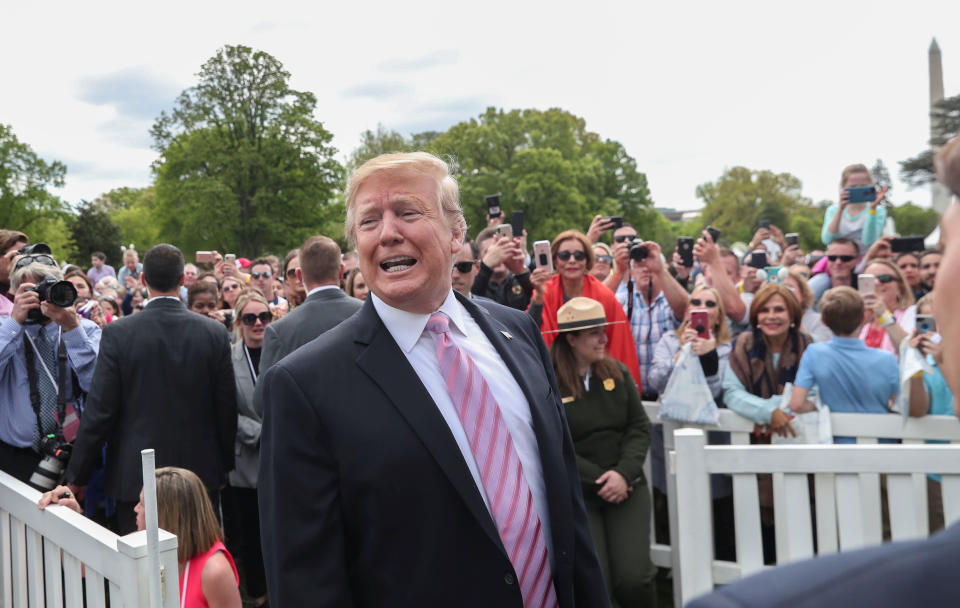Trump 'not even a little bit' worried about impeachment. Should he be?
President Trump on Monday said he’s “not even a little bit” worried about being impeached, implying that he has been cleared by the Mueller report. But the history of the presidency suggests his unconcern might be premature.
“Only high crimes and misdemeanors can lead to impeachment,” the president tweeted. “There were no crimes by me (No Collusion, No Obstruction), so you can’t impeach. It was the Democrats that committed the crimes, not your Republican President! Tables are finally turning on the Witch Hunt!”

During the White House Easter Egg Roll, Trump was asked by reporters if he was worried about the possibility of impeachment.
“Not even a little bit,” he said.
Q: Are you worried about impeachment, Mr. President?
Trump: Not even a little bit.https://t.co/FYMh00lU7p pic.twitter.com/BiWHExrTzu— Dylan Stableford (@stableford) April 22, 2019
But many constitutional scholars view impeachment as a political, not a judicial, act. In 1970, then-House Minority Leader Gerald Ford said, “An impeachable offense is whatever a majority of the House of Representatives considers it to be.”
He wasn’t wrong. In 1974, three articles of impeachment against President Richard Nixon were approved by the House Judiciary Committee. All three alleged Nixon had abused his presidential powers. But just one — obstruction of the Watergate burglary inquiry — involved a criminal violation.
The Judiciary Committee took the view that the charge of high crimes and misdemeanors covers allegations of misconduct including “abuse of official power” and “neglect of duty” as well as “corruption and betrayal of trust.” (Impeachment proceedings against Nixon ended with his resignation.)
Trump himself, during Barack Obama’s presidency, raised the issue as a rhetorical question.
Are you allowed to impeach a president for gross incompetence?
— Donald J. Trump (@realDonaldTrump) June 4, 2014
A redacted version of special counsel Robert Mueller’s long-awaited report, released last week, found no evidence that Trump or his campaign engaged in a criminal conspiracy with Russia. And while Mueller declined to charge Trump with obstruction of justice, investigators explicitly refused to exonerate the president.
“If we had confidence after a thorough investigation of the facts that the President clearly did not commit obstruction of justice, we would so state,” the report explained. “We are unable to reach that judgment. The evidence we obtained about the President’s actions and intent presents difficult issues that prevent us from conclusively determining that no criminal conduct occurred. Accordingly, while this report does not conclude that the President committed a crime, it also does not exonerate him.”
The report chronicles at least 10 attempts by Trump to obstruct the special counsel’s investigation.
Those attempts at obstruction of justice could constitute impeachable conduct, legal experts say.
“It’s plausible,” Philip Bobbitt, constitutional scholar at Columbia Law School, told the Washington Post. “Mueller depicts an executive branch that is using the levers of his constitutional power in a corrupt way. It’s not that a president can’t determine whom to prosecute or investigate, or give advice to members of the executive to shape their testimony at legislative hearings. It’s that he can’t do so with the intent to frustrate the investigation of his own culpability. We certainly have ample evidence that suggests this what he was trying to do.”
George Conway, a prominent conservative lawyer and husband of White House counselor Kellyanne Conway, believes the evidence collected by Mueller is so “damning” for President Trump that he should be impeached immediately.
“What the Mueller report disturbingly shows, with crystal clarity, is that today there is a cancer in the presidency: President Donald J. Trump,” Conway wrote in a scathing op-ed published in the Washington Post on Thursday night. “Congress now bears the solemn constitutional duty to excise that cancer without delay.”
On Friday, Sen. Elizabeth Warren, D-Mass., became the first major Democratic presidential candidate to call for impeachment proceedings based on the results of Mueller’s probe.
“The severity of this misconduct demands that elected officials in both parties set aside political considerations and do their constitutional duty,” Warren tweeted. “That means the House should initiate impeachment proceedings against the President of the United States.”
But House Speaker Nancy Pelosi, D-Calif., and other Democratic leaders have said they want more information, including Mueller’s full, unredacted report and related testimony, before moving forward on impeachment.
On NBC’s “Meet the Press” Sunday, Rep. Jerry Nadler, D-N.Y., chairman of the House Judiciary Committee, said Trump’s obstruction of justice, if proven, “would be impeachable.”
He added: “We may get to that. We may not.”
_____
More coverage of the Mueller report from Yahoo News:



